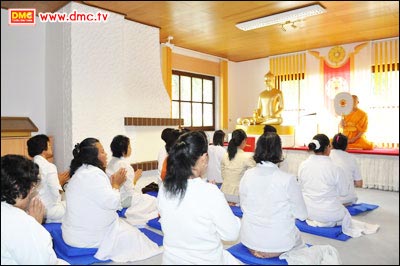Listening Regularly to Dhamma Teachings # 2
Mark of a good listener to the Dhamma
Mark of a good listener to the Dhamma
1. Not look down on the level of knowledge of the teacher:
Do not think that the monk is young, you are older than the monk and you have listened to the sermons of senior well-known monks many times, therefore there is nothing you can learn from the young monk.
Pay always respect and encourage the monk to teach Dhamma so he or she can increase their self-confidence.
The Buddha warned that there are four things which you should never underestimate the importance of:
- A young king: some kings have3 reigned since they were at young age (e.g. Alexander the Great reigned over half of the world since he was not yet twenty years old.
- A small poisonous snake: you can die from the bite even of a smack snake.
- A small fire: even a small fire can burn down an entire city.
- A novice: some have become Arahants at the age of seven.
2. Not being conceited:
Do not think that you are more knowledgeable in Dhamma than the monk. Only because you have a Bachelor, Master or Doctor Degree and more worldly experience than the monk.
If you assume that you are better than the Dhamma teacher, you will miss the opportunity to gain the knowledge and useful thought through listening to the Dhamma teaching. Like “Uruvela Kassapa” who always believed that he was an Arahant and superior to the Lord Buddha, so he never listened to the teaching from the Buddha. Until the end, when the Buddha warned him to stop being conceited that he is an Arahant, he finally repented and diligently listened to the Dhamma teaching from the Buddha with respect until he attained the Dhamma within and became Arahant.
You should be able to deliberate upon and analyze the Dhamma as you
listen ingeniously so that you can understand the Dhamma profoundly with ease.
3. Keep concentrated, not trying to find faults in the teachings:
The better your mind is concentrated as you listen to the Dhamma, the more you will understand. If you are always looking to find faults with the teacher, you will lose your concentration, and not be able to follow through and never gain any knowledge or understanding of the dhamma.
4. Be wise; means be intelligent:
You should be able to deliberate upon and analyze the Dhamma as you listen ingeniously so that you can understand the Dhamma profoundly with ease. For those who have difficulty to understand the Dhamma, do not look down on yourself that you are not intelligent enough to acquire the Dhamma knowledge. Although you can not understand the Dhamma right now, but at the very least, this will become your predisposition in the next life when you rehear the Dhamma items again, you will be able to understand it with ease.
5. Not look down on the subject of Dhamma being taught:
Never think that “it is too easy for me, I already understand it thoroughly, and I don’t need any further explanation”
Listen to Dhamma teaching will bring many benefits to us. Even though it is what we already are knowledgeable of, but having listened to that Dhamma items again will allow us to be more proficient/masterful in the Dhamma subjects, like Venerable Kappina who at the first time of Stream Enterer. Having listened to the same Dhamma teaching from the Lord Buddha again, he finally became Arahant.
Listen to Dhamma teaching will bring many benefits to us.
Predispositions acquired through listening to the Dhamma regularly
Prdispositions refers to our behaviours or familiarities from the past that will gradually become our predispositions for the future.
Listening to the Dhamma teaching is a way to cultivate the virtue as the “Capital asset” of life and as a predisposition for the future existence. It can also help us to progress and to attain the Dhamma within with ease. As The Lord Buddha taught us that the person who regularly listens to the Dhamma, puts the effort to learn and to comprehend, or even try to learn the Dhamma by heart without comprehension, the person will gain these four meritorious deedes:
1. After passing away, in the subsequent existence, one will be in the heaven realm. One will have the comprehensive wisdom to understand quickly the Dhamma by one self, able to quickly recollect the Dhamma and able to practice the dhamma till attaining the path and fruit of Nirvana with ease.
2. After passing away, in the subsequent existence, one will be in the heaven realm. When a celestial Buddhist monk with super natural power arises to teach the Dhamma, one will be able to recollect the Dhamma and attain the path and fruit of Nirvana with ease.
3. After passing away, in the subsequent existence, one will be in the heaven realm. When an angel teaches the Dhamma, one will be able to recollect the Dhamma and able to attain the path and fruit of the Nirvana with ease.
4. After passing away, in the subsequent existence, one will be in the heaven realm. Even without the celestial Buddhist monk with supernatural power or the angel colleagues to expound the Dhamma, but after listening to the other angels
Dhamma and able to attain the path and fruit of the Nirvana with ease.
Those who regularly perform their Morning and Evening Chanting, although they might not understand the meaning of those Pali terms, it is certainly not a waste of time because at the very least it will bring the stillness of mind and familiarity with the Pali terms or phrase, so that in a future existence even overhearing the sound of chanting or sermon, one will put effort to get the opportunity to listen to the Dhamma teaching and be able to understand it with ease as a result of the past disposition they have built up, and enable them to attain the path and fruits of Nirvana with ease.
Purifying the mind and bringing happiness
The Benefits of listening to the Dhamma
1. Hearing things never before heard:
Because the Dhamma teacher will always put in the effort to find new items of Dhamma for the listener, if we attend a Dhamma sermon, we will be hearing something we have never heard before.
2. Clarifying things already heard:
If the subject of the sermon is what we have already heard before, at the very least, it will allow us to revise and deepen what we already know and raise our mastery to a new level allowing us to better memorize it.
3. Dispelling one’s doubts:
If one still has some reluctance to give up some unwholesome habits or strive for some new wholesome habits, after hearing the Dhamma sermon, all the doubt and reluctance will be dispelled. One will gibe up unwholesomeness and strive for wholesomeness in no time.
4. Straightening one’s view: In the course of our everyday life as we journey in pursuit of virtue, we could be influenced by the defilements and many obstacles which might conspire to infiltrate our thinking with “false views” [miccha ditthi]. Such false views can eventually lead our spiritual cultivation to deviate from the objectives we have set. The advantage of regularly hearing Dhamma teachings is that we will be able to identify the working of “False View” in our mind and to uproot these by cultivating the “Right View” [samma ditthi].
5. Purifying the mind and bringing happiness:
Hearing a Dhamma sermon will help reminding us to keep our mind out of distraction with sensuality, vengeance and aggression, It makes it clearer to us where our weaknesses lie and raise up our morality giving us the ways to overcome those weaknesses definitively and ultimately attaining the path and fruit of Nirvana.
“O! you who see the danger in the cycles of existence [samsara], in what so ever era the Noble Disciples hear the Dhamma, listen to the marrow of their bones, listen to the innermost part of their mind, and who muster all their encouragement, bending their ears to listen in earnest-in that era their Five hindrances will be overcome and their Seven Factors of Enlightenment [bojjhanga] will be brought to completion through the power of their meditation.”
Meditation - Related Articles
" />
" />
" />
" />









